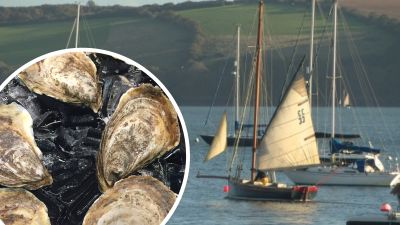Water pollution damaging oyster industry according to fishermen in Cornwall

An oyster fisherman from Cornwall says water pollution is damaging the industry.
Chris Ranger catches oysters in the traditional way under sail and using hand-pulled dredges on the waters of the River Fal.
It is believed to be the only oyster fishery in Europe where such traditional methods are used.
But after an already difficult two years for the industry, Mr Ranger says he is currently only able to sell 20 per cent of his catch due to concerns over the local water quality.
He said: "Whether it's Brexit, whether it's Covid, you know the hospitality market collapsed and then the domestic home market which was just keeping us afloat during the pandemic just disappeared as soon as there were news reports of the British rivers and sewage problems.
"Whether the water is clean today, dirty tomorrow and then clean the next day doesn't matter.
"If that's on the front page of the newspaper that stays in people's minds for a long time.''
In September, an investigation by The Independent newspaper found that storm overflows had pumped wastewater into the River Fal for more than 7,500 hours last year.
Chris says interest in locally caught shellfish has now dropped and there are thousands of pounds worth of mussels going to waste on the harbour side that he cannot find a buyer for.
He added: "I've had about 10 tonnes and a couple of tonnes are here, and really these are great mussels for the market, and no one wanted them because they were Fal river mussels."
Shellfish production areas are classified according to the levels of E. coli detected in shellfish flesh.
The highest rating is class A, meaning shellfish can be harvested for direct human consumption or exported live to the EU.
Much of the Fal estuary is currently classified as B class waters.
According to the Food Standards Agency that means the shellfish can be supplied for human consumption after one of three processes.
That includes purification in an approved establishment, relaying for at least one month in a classified Class A area, or using an approved heat treatment process.
The impact of water quality is an issue for fisherfolk not just on the River Fal, but on waterways across the UK.
Some of the region's oyster fishermen have now left the industry all together.
Martyn Oates ran an oyster fishery business on the River Yealm in Devon for 20 years.
He told ITV News: "It was a pretty viable business, but in the end the pollution was always just hanging over you, so it makes it really difficult."
The Labour Party's Shadow Chancellor of the Exchequer Rachel Reeves visited the Fal Oyster Ltd fishery at Mylor last week during a visit to Cornwall.
She told ITV News: ''We just can't afford to lose industries like this.
"It is about the heritage of Cornwall, it's about what makes this place so special not just to people in Cornwall but to people all around the country.
"We need to hear and heed the warnings of fishermen here in Cornwall who are worried about water quality, who are worried about the impact that's having on their ability to sell their produce here and abroad."
According to South West Water, a wide range of influences affect river water quality, including agricultural and urban run-off.
It says less than 20 per cent of pollution is within the direct control of water companies.
In a statement a spokesperson for South West Water said: "South West Water’s largest environmental investment programme in 15 years, WaterFit, is now well underway, focused on delivering benefits for customers, communities and the environment.
"Through WaterFit, we are increasing investment in our wastewater network to dramatically reduce our use of storm overflows as part of our plans to reduce our impact on rivers by one-third by 2025, as we look to ensure we are not the reason for any river failing to meet ecological standards by 2030."
The Environment Agency says it is 'holding the industry to account' over water quality.
In a statement it said: "Sewage pollution can be devastating to human health, local biodiversity and our environment.
"The Environment Agency is holding the industry to account on a scale never seen before: we have launched a major investigation into possible unauthorised spills at thousands of sewage treatment works, and placed new requirements on water companies to significantly increase their monitoring and reporting.
"Only wider action through water company investment, better farming practices and simple steps taken in the home to prevent sewer misuse will help ensure we have healthier sewers, cleaner rivers and a better environment for all."